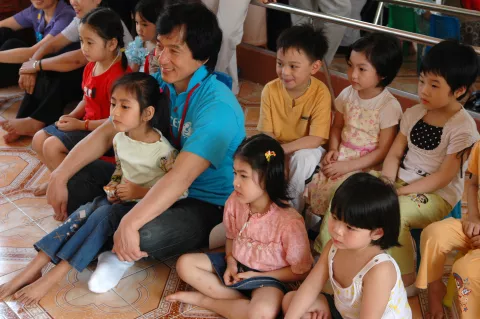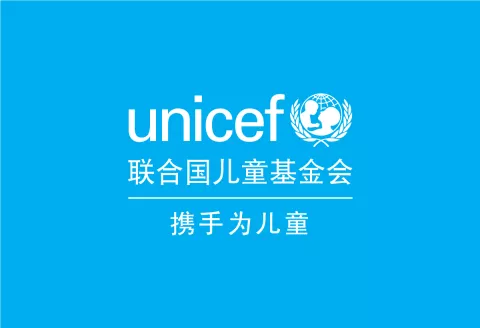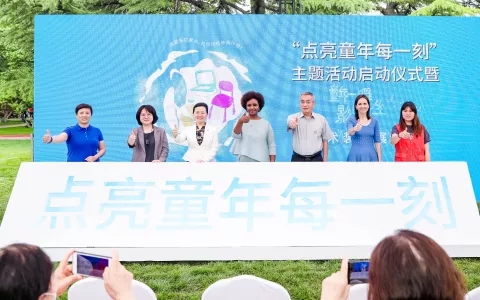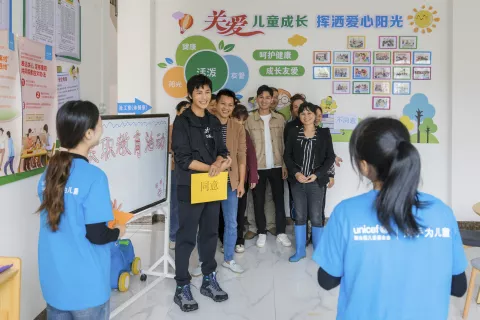China, Vietnam join hands to fight cross-border trafficking of women
China, Vietnam join hands to fight cross-border trafficking of women
It is about 9:00am in the morning. The Beilun He River ("Song Ka Long" in Vietnamese) that borders Dongxing, China, and Mong Cai, Vietnam, is a hive of activity. Boats loaded with Vietnamese passengers and goods sail across the river to the Chinese side to begin their day's trade. When the river water ebbs, the cross-border waterway narrows to no more than 20 metres. The ferry charges passengers just 0.50 yuan (about 6 US cents) for a single trip, bringing forth Vietnamese hawkers, mostly young women who speak fluent Chinese, with their goods such as fruits, perfume, and seafood to Dongxing. For people living in these border areas, going to the other side is as simple as visiting a relative living next door. Customs inspection is perfunctory, so long as one returns home before five in the afternoon.
Human trafficking amid economic boom
Dongxing City, which nestles in the southwest tip of Guangxi Autonomous Region, shares a 33-kilometre borderline with Vietnam. Since relations between the two countries were normalized in 1989, border trade has grown at 20 percent every year. In 2001, a total of 2.7 million crossings were recorded, and the cross-border trade came to 850 million yuan (about US$102 million). With the economic boom, however, come a range of problems—illegal entries into China by Vietnamese nationals and, on top of this, trafficking of women and children. According to a 1999 survey by Dongxing Women's Federation, 1,269 Vietnamese women are living in the city with a population of 120,000. Of them, 647 are married to local residents without going through legal formalities.
Statistics from Dongxing Public Security Bureau indicate that 242 Vietnamese women are involved in the 74 trafficking cases recorded since 1990. To date, 231 of these women have been rescued.
Ha Thi Phan, 32, is from Mai Pha Commune in Lang Son in northeast Vietnam. After she was divorced, she came back to her own family along with her two children. But before long, she was asked to leave. According to tradition, once a daughter gets married she will belong to her husband's family and there is no room for her in her own family.
With neither a home nor money, Ha became a coolie in 1991, carrying goods across the border day after day. "One day," she recalls, "my hirer told me that if I go further into China I could earn more money. So I did, leaving my children to an acquaintance."
But on her way she was led to a Chinese woman who later sold her to a Chinese man in Ningming County, about 40 kilometres from Pingxiang, also a Chinese border town. The "couple", so to speak, could hardly communicate because Hadid not speak Chinese. "The man often beat me," she says. "To win his trust I decided to have a baby with the man."
In 1993, two months after the baby was born, Ha persuaded the man into letting her go back to Vietnam and see her parents. "I made him believe that my parents were seriously ill and wouldn't live long," she says.
The story has a happy ending. Now united with her other children, Ha is earning her own living with the small credit supported by International Organization for Migration.
A difficult fight
The Pingxiang Public Security Bureau rescued 13 Vietnamese women like Ha between 1992 and 1997. All of them had been sold for "marriage" in China. During the nationwide crackdown on trafficking of women and children in 2000, the bureau rescued 103 Vietnamese women, nearly half of whom had been forced into prostitution. According to Wei Xiaoning, director of the Women's Rights Department of the Guangxi Women's Federation, Guangxi police rescued and expatriated a total of 1,030 Vietnamese women during the crackdown.
Yuan Guangrong, director of the Public Security Bureau of Guangxi Autonomous Region, explains that in most of these cases, Vietnamese women were trapped by phony promises of jobs or marriage. "Nowadays," he says. "Traffickers often use violence to force their victims into submission. In some cases, the victims were duped when they were kidnapped. There are also cases in which rape or even group rape was committed.
"What's more, he adds. "The destination for trafficking has extended from border regions to inland provinces such as Henan, Hebei, Anhui, Jiangsu and Guangdong."
According to the official, most proven human traffickers are Vietnamese. More often than not, they gang up with Chinese criminals in human trafficking, targeting Vietnamese women who are in China without legal papers. Places like railway and bus stations are their hunting grounds. Some women are victims of human trafficking themselves but end up by committing the crime against other women.
"The fight against cross-border offenses is difficult, indeed," the official says. "Due to the mobility of the suspects, it is often impossible for us to collect evidence against them or check their identities," says Yuan.
Repatriation of the victims, who are illegal immigrants under Chinese laws, constitutes no small burden for the Chinese authorities. Under standing rules of China's Ministry of Public Security, once a woman suspected of being Vietnamese is rescued, the concerned provincial public security bureau must deliver a note to this effect to the Vietnamese Embassy or the concerned Vietnamese consulate. Upon the receipt of the notice, the Vietnamese side is to check the case and notify the Chinese side of the result and decision of acceptance or rejection within 42 days. The Chinese side then must notify its Vietnamese counterpart of the detailed time, place and name list of the transferral 10 days in advance.
The local government is obliged to pay for the food, lodging and sometimes medical treatment incurred by the trafficked victims before their repatriation. "Moreover," says Qi Fuwei, director of the Dongxing Public Security Bureau. "Dongxing is the last leg for the repatriation of trafficked women identified anywhere in China as Vietnamese nationals."
Support from UNICEF
To coordinate the two countries' fight against human trafficking, the United Nations Children's Fund (UNICEF) in China facilitated a visit to Hanoi, Vietnam for Chinese officials from the Ministry of Public Security and All-China Women's Federation in May last year. During the trip, there was an agreement between both sides that an exchange of visits would follow up this year to obtain first-hand knowledge of the problem and enhance the partnership between China and Vietnam.
"The exchange of visits is expected to familiarise the two sides with the social and economic context of the situation of cross-border trafficking to pave the way for joint interventions in the future," says Masahiro Ono, chief of the Protection and Community Service Section of UNICEF-China.
[page]
The visit materialised at the end of March with the participation of police officers, criminal investigators, social welfare officials, officers of frontier forces, as well as representatives of women's organizations from both countries.
"Trafficking of women and children is a greed and evil that knows no border. It is a gross violation of the rights of women and children that should have zero tolerance," says Anthony Paul Bloomberg, UNICEF representative in Hanoi. He admits that this "difficult and distressing issue requires all efforts from frontiers of both countries."
According to Bloomberg, UNICEF has put anti-trafficking as a priority in Southeast Asia. "It is within the mandate of UNICEF to work with governments to fight trafficking of women and children."
Echoing his words, David Parker, Senior Program Coordinator of UNICEF-China, commends both countries for "taking this challenge with courage"; and building their work on careful studies that reflect the reality of their own situations. "The cooperation of police, women's federations and local governments in the concrete plans of work is a demonstration of the determination and commitment to address this critical problem," he notes.
At the end of the exchange visit, the two sides agreed to jointly strengthen border administration to reduce illegal entries, and coordinate activities on the awareness of trafficking in border areas of both countries.
They also agreed to promote joint training, improve the repatriation mechanism by streamlining procedures respectively and shortening the repatriation process, establish transition centers and liaison offices on both sides and share information to facilitate joint rescue actions.
"We are planning to help Dongxing City set up a transit center where Vietnamese victims of trafficking are provided with initial care and protection services before they are transferred to Vietnam. Through the joint repatriation mechanisms to be established by both sides, the victims then will be received by a transit center in Vietnam and will be provided with appropriate support for their rehabilitation and reintegration into society," says Ono from UNICEF-China. The centers are also intended to offer counseling and vocational training, which are critical and crucial components for the empowerment of the victims in the rehabilitation process.
He adds that UNICEF offices in China and Vietnam will learn from the model of United Nations Office for Drug Control and Crime Prevention to establish liaison offices in both countries to coordinate anti-trafficking actions.
Over the past years, China has set up a special information network for the crackdown on trafficking of women and children, in addition to taking advantage of DNA technologies in matching abducted children with their parents.
Cooperation with UNICEF in the last three years has focused on communication, awareness-raising, the establishment of transition centers for victims of domestic trafficking, as well as training of police officers on the United Nations Convention on the Rights of the Child and other international conventions.
"In the past, police officers have paid more attention to their duties while enforcing the law. They were not very sensitive to the rights of women and children while approaching them, and were weak in psychological counseling," says Zhu Yantao, a section chief at the Criminal Investigation Department of the Ministry of Public Security.
According to Ono, it will make a major difference when the police switch their perception of these trafficked women from "offenders" to "victims."
Since 1999, 1,500 police officers at the county level have attended training courses held in 13 provinces on psychological counseling for victims of trafficking. Last year, police officers in charge of anti-trafficking from 26 provinces went to Thailand and visited Thai police, women's organizations and non-governmental organizations and acquainted themselves with the methods of psycho-social counseling for victims of trafficking, their protection and reintegration.
What's more, the women's federation and public security bureau in Yunnan Province are collaborating with the International Labor Organization on community prevention of trafficking.
"The Chinese police will make all the more efforts to protect women and children under the principles agreed upon by the two governments," pledges Fu Zhenghua, deputy director general of the Criminal Investigation Department of the Ministry of Public Security.
Nguyen Thi Yen, deputy governor of Lang Son Province, Vietnam, says "The most pressing issue right now is to better promote the cooperation (in fighting trafficking) between border provinces (of the two countries) to purify the society."
At least 22,000 women have been trafficked to China to be wives, sex workers or housemaids since 1991. And some 8,000 of them have been repatriated, according to Le Hong Loan, chief of the rights promotion and child protection section of UNICEF-Vietnam.
UNICEF's concern in Vietnam is mainly in the areas of research, legislation and policy improvement to protect the rights of victims of trafficking. Communication activities have also been undertaken to raise awareness among government officials, community workers, as well as women and children.
"Counseling will be one of the areas that UNICEF (Vietnam) will promote to help government partners improve and provide better counseling for the victims, because when they get back they normally have significant psychological issues," she says.
Loan believes that the visit provided a good opportunity for both governments to look at women and children who have been trafficked as victims, not simply as illegal immigrants.
"Although the issue (of trafficking) is very complicated, if we keep in mind that they are victims, both countries and UNICEF will help solve the problem to protect their rights to the best," she says.





